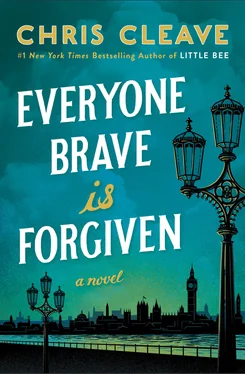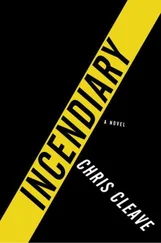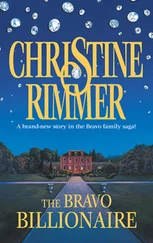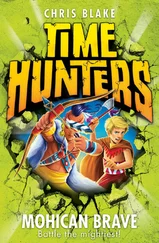Thomas had turned out to be a handy gramophone operator. He had brought some recordings from home — Maurice Chevalier and Cole Porter — and since the children had been good all week she allowed those whom the mood took to dance. While the music played she opened the heavy hymnal in which the class had pressed summer flowers. The children who wanted to do collage came and took some. The others danced to the gramophone or went out to the corridor for hopscotch, which was another thing Mary permitted on a Friday afternoon to any child who could prove beyond reasonable doubt that the war had not been their idea.
Only Zachary sat alone at his desk, eating the paste he should have been sticking flowers with.
“Zachary, is there nothing you won’t eat?”
His thoughtful chewing suggested he had taken her question under advisement.
“How are things at home?”
He grinned pastily. “My father says I can go to the shop. He’s giving me a ha’penny and I already have a ha’penny, so I can get eight pear drops at eight for a penny, or four barley sweets at four a penny, I haven’t decided.”
It was a solemn choice. Mary nodded. “Supposing you bought two barley sweets, how many pear drops could you still buy?”
“Four,” said Zachary.
“And what is one, minus two quarters, times eight?”
He eyed her as if astonished by the cruelty. “Don’t.”
“But it is the exact same question, don’t you see? Mathematics is only life with the word ‘sweets’ removed.”
He shrugged. “Can I have a cigarette now?”
“Not until you are twelve.”
“But you said I could have one when I was eleven.”
“That was when you were ten. The rule is: no cigarettes until cigarettes are shorter than your fingers.”
He scowled. “I hope the Germans invade and shoot you.”
“Your new German teacher would be even stricter. They are famous for it, I’m afraid.”
“Will they come?” he said, with such unheralded anxiety that it caught her off guard. The music had stopped; Thomas was changing the disc.
Since all the children were listening, Mary laughed. “Of course not!”
But of course the Germans would come. The reality was there on the blackboard and in the ache of her forearm. It was all very well listening to patriotic speeches on the wireless. It wasn’t until one had used the whole board to map the great sweep of the Blitzkrieg that one realised how little extra chalk would extend the onslaught to London.
“What if they come at night?” said Zachary. “When nobody’s expecting?”
She shook her head. “We have whole ministries full of people whose only job is to expect. They have plans for if the moon goes square and plans for if the sun loses his trilby. Trust me, children, we will be ready.”
Zachary tried a smile. But of course the Gestapo would murder him, after the Germans won. London would hold, and fight — it wouldn’t be like Paris. There would be a siege, with horrifying hunger. The pigeons would be eaten, and then the rats, using trapping techniques that would be disseminated in illustrated pamphlets, and finally when the pigeons and the rats and the family pets were gone, the dead would be cannibalized in a systematic, orderly and documented fashion according to a protocol that doubtless already existed in the contingency files of one of the more tight-lipped ministries. Those left alive would be grateful for death by the time the city fell.
“So everything will be fine?” said Thomas.
“Yes, children, everything will be fine.”
Mary smiled for her class. But only the previous afternoon, over ice creams in Hyde Park, she and Hilda had discussed what they would do if the enemy came. The problem with an education was that one knew perfectly well what soldiers did when they sacked a refractory city — it was all there in Virgil and Gibbon.
“I should think the soldiers will ravish us until they are weary from it, don’t you?” said Hilda, yawning.
Mary licked her ice cream. “It might not be awfully fun.”
“Selfish, I know, but we probably ought to kill ourselves first.”
Mary said, “Is your ice cream melting, too?”
“Your problem is that you don’t eat it fast enough.”
“Because vanilla goes straight to the hips. It is well known.”
“Give me yours as well, then. I intend to become as fat as a bus — then the Germans will jolly well rape you first.”
“I thought you wanted us to do away with ourselves.”
Hilda gave a worried look. “I might not manage it.”
“I can shoot you with my father’s gun if you like. You know, the pretty one with the geese on the stock.”
“I’d hate for you to go to any trouble.”
“Oh no, really. It would be my absolute pleasure.”
“And you? I’d hate for you to be left out.”
“I can have Palmer shoot me. I’m sure he’ll have a way of doing it discreetly, so that one hardly notices.”
“Oh good — let’s have Palmer shoot both of us, shall we? I trust he has a Sunday firearm that he favors if your father is in residence, and a workaday gun if not?”
“I should be disappointed to find it were otherwise.”
“Have him shoot me in the heart, will you? This hair took all morning.”
“Consider him advised. But what shall we really do, if they come?”
Hilda dabbed at her ice cream. “It would have to be the river. Weigh ourselves down with stones and wade in.”
“Very well,” said Mary. “But nowhere downstream of Westminster.”
“Good god, no! One hopes for death, not mortification.”
Mary realized her class was looking up at her. She clapped her hands and smiled. “Come along, then! Shall we have another disc?”
Thomas started up the gramophone with a Charleston from the Piccadilly Players. It was Tom’s — one of the first discs he’d played her. Zachary went to the piano and played along. He found the key first time, showering playful notes on the off-beat. So long as a thing was not perfectly simple to learn, the boy was good at it. Searching for the key to him she had read his reports from the three years of schooling he’d had since arriving from America. In every one of them his teachers had written: Must try harder .
“Miss?” said Zachary, looking up from the keyboard. “Are you all right?”
“I’m sorry,” she said. “For what happened to you.”
“You didn’t do it.”
“Yes, but… we did it.”
A shrug, a few chords. Then: “Miss, would you like to dance?” He grinned, fingers spritzing the keyboard.
She laughed. “Oh good lord, stop it!”
He held out his left hand while his right still played along. “Well?”
On the disc the band sang “Sunny Skies.” She said, “I shouldn’t.’
“Why?”
“I mean, I don’t know if… we… should.”
He gave a quick smile and looked back down at the keyboard. “All right.”
Mary’s chest ached, which was unfair of it, since of course she was only being sensible. One oughtn’t to dance with the children — of any stripe — and especially not a colored one. Word would reach all of the parents by sundown, and there would be no end of unpleasantness.
But the ache deepened as she watched him play. And she thought: But so what? There might be a sniffy letter, even an official reprimand. But perhaps one ought to set one’s own transgressions against the enemy’s, these days. When one considered that the Germans would establish air superiority before bringing in a spearhead of tanks backed up by infantry in phased echelons, and follow up with collective reprisals against civilian elements that continued to resist, to dance seemed quite inoffensive.
“On second thought, thank you,” she said. “I’d love to dance.”
Читать дальше












